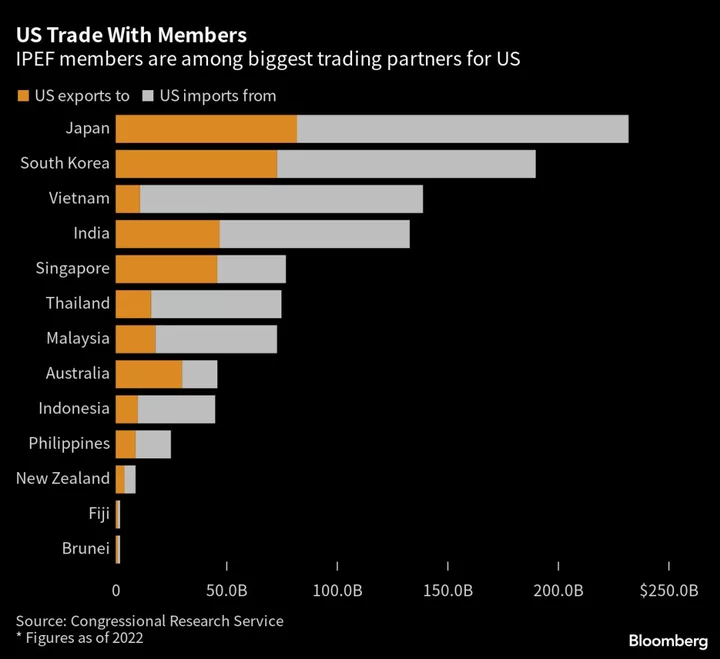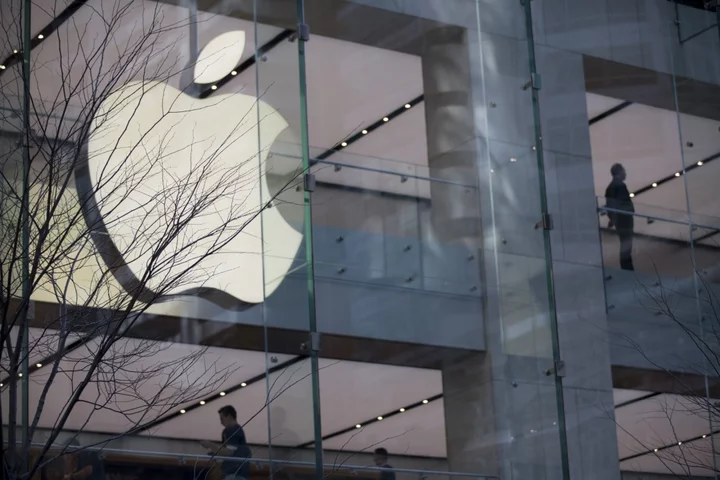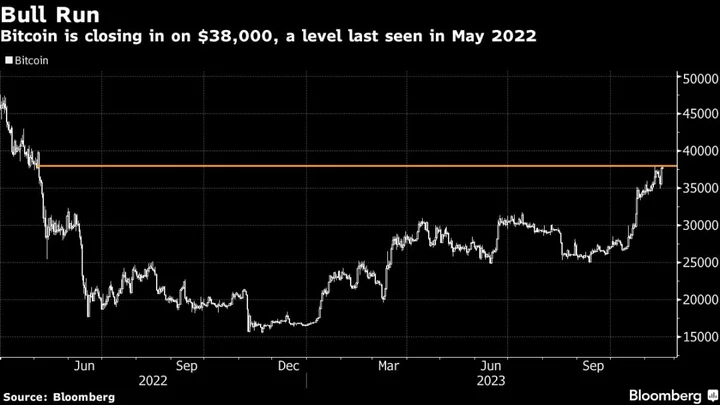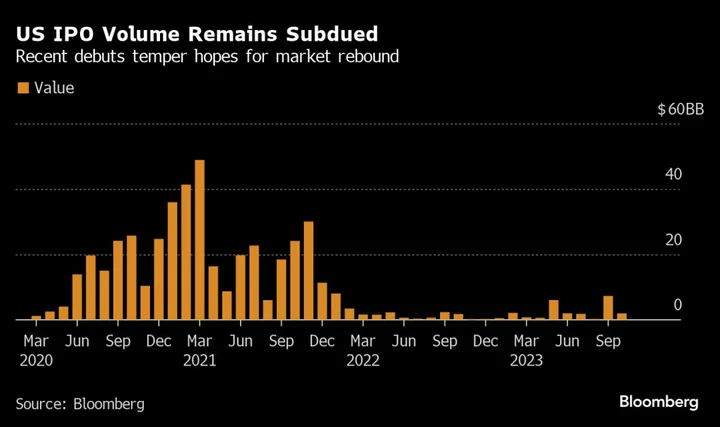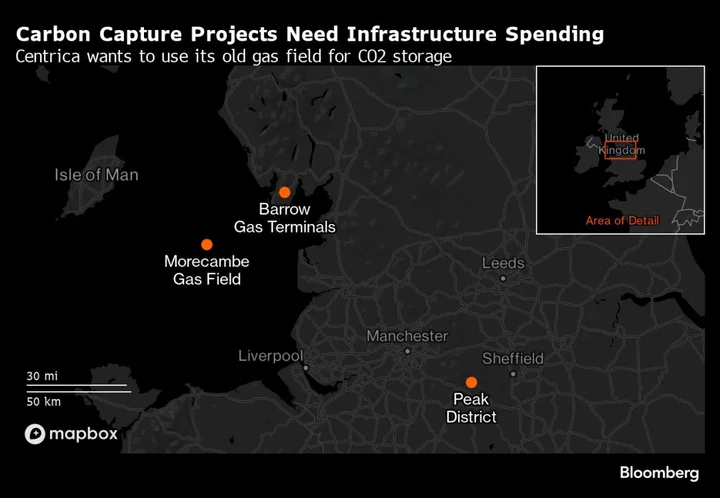The economic core of the Biden administration’s much-touted Indo-Pacific strategy to counter China is fraying, frustrating allies even as the White House hails its progress.
President Joe Biden and leaders of 13 other countries involved in the Indo-Pacific Economic Framework on Thursday signed an agreement to communicate and cooperate more on issues related to supply chains. They also mostly completed work on two other “pillars” related to the environment and governance issues like tax evasion and corruption.
The event, coming a day after Biden sat down for a meeting with China’s Xi Jinping, was designed to project US strength in the region.
But the mood around what many see as the most important element of IPEF – the pillar negotiating a modest collection of enforceable trade rules – has become more fraught. Allies are questioning whether the Biden administration can conclude a deal as negotiations bog down amid domestic political opposition, including from some members of his own party.
Some Asia-Pacific allies fear a repeat of the experience surrounding President Barack Obama’s Trans-Pacific Partnership. That pact aimed to surround China with US-friendly economies, but after years of hard negotiations it was dropped by Donald Trump after he campaigned against it and other trade deals in 2016.
For some in the region, the lack of progress in IPEF following the TPP debacle amounts to a lost decade of negotiations with the US and contrasts with China’s eagerness to expand its own web of trade agreements in the region. Such concerns are being echoed in a US business community that’s found itself increasingly at odds with the Biden administration when it comes to trade.
“Collapse of the IPEF trade pillar would deal a blow to US standing in the region,” said John Murphy, senior vice president for international policy at the US Chamber of Commerce. “To follow President Trump’s withdrawal from the TPP with President Biden’s capitulation on his own trade arrangement would be a dreadful setback for US leadership.”
Political Pressure
According to senior officials from other IPEF countries and analysts and business executives tracking the talks closely, the US had for months in the lead up to Thursday’s meeting of leaders in San Francisco told other countries that it wanted to announce that negotiations for at least part of the trade pillar had been concluded.
Instead, however, at the last minute the US dropped that plan because of opposition from Democratic trade skeptics in Congress and fears that IPEF might be used by likely rival Trump as a political weapon against Biden in the 2024 campaign.
The pressure from Capitol Hill has come from people like Senator Sherrod Brown, an Ohio Democrat who has long campaigned against trade agreements.
“I’ve made it very clear that the trade portion of the Indo-Pacific Economic Framework is unacceptable, and I’m glad it’s not moving forward,” he told reporters in Washington.
That sort of skepticism is a blow from the left for a Biden administration that has tried to portray its trade policy as worker-centric. Biden, who is lobbying heavily for union support in his campaign for reelection, on Thursday announced a push to enforce worker rights such as the freedom to join unions in any trade agreement.
“We will continue working to better facilitate high standard trade and advancing workers rights with strong enforcement of labor standards,” Biden told a business meeting on the sidelines of this week’s Asia-Pacific Economic Cooperation leaders meeting in San Francisco. “It’s critical to building a stronger, fairer and more resilient economy for families across the Pacific.”
Katherine Tai, Biden’s trade representative, on Thursday also sought to play down differences with other countries. She defended work on the trade pillar, saying progress has been made and that the decision not to make a big announcement was more about public communications than substance. Part of her message to fellow IPEF trade ministers this week has been “to make clear our commitment to continuing the work,” she said.
“We will stick with it; we believe in this vision,” she told reporters on Thursday in San Francisco. As for critics, “what we are encountering is resistance to change and a slowness to coming to the realization of what we’re trying to do.”
People close to the talks said they are deadlocked over labor and environmental standards and digital trade provisions. The stalemate, they said, has been made worse by confusion about the Biden administration’s plans, and in the case of the digital chapter, a 180-degree turn in the US negotiating position in recent weeks.
Washington recently abandoned a long-standing US policy of advocating for the free flow of data across borders and against regulations requiring commercial data to be housed behind national firewalls. That change has drawn criticism from business groups and industries ranging from cloud computing to financial services and manufacturing, who argue dropping the fight will lead to a Balkanized internet and hurt the international operations of US companies.
In the case of cloud computing, industry experts say the lack of US advocacy for free-flowing data opens the door to China exporting its own heavy-handed controls of the internet. It also potentially gives lower-cost Chinese cloud providers an advantage in other markets.
While negotiations are likely to continue in some form, there’s resignation in other IPEF countries that little progress is likely in the 2024 election year. That leaves any deal dependent on the outcome of the presidential vote.
Some IPEF members are more hopeful than others. At the very least, some officials close to the talks say, the US is discussing a possible trade agreement that might grow in ambition one day. Even a frustrating engagement with the Biden administration is better than what might happen to US trade policy in the region if Trump is elected, they say.
“The trade pillar has been more difficult and we have not made as much progress as people were hoping,” Australia’s trade minister, Don Farrell, told Bloomberg in San Francisco. “We know particularly after the 2016 presidential election, just how difficult trade issues are in the United States. But I think work will continue.”
In private, others are less optimistic. One business executive likened the mess around the IPEF trade discussions to the disorderly US withdrawal from Afghanistan in 2021. It was leaving allies exposed and would come back to haunt the US, the executive said.
Other people close to the talks said failure to advance on trade within IPEF leaves the door open to China.
“This underscores how difficult it is for the United States to move forward on trade and economic issues in the region,” said Wendy Cutler, a longtime US trade official now at the Asia Society. “And this is a big problem because these are precisely the issues that are of key importance to our trading partners in the region.”
Besides applying to join what’s now known as the CPTPP, which includes US allies like Australia, Canada, Japan and recent joiner the UK, China is moving to upgrade its own trade agreements.
“All of that will probably become more appealing to other countries in the Indo-Pacific if they’ve concluded that the United States just can’t get its act together to be a strong economic partner,” Cutler said.
In resource-rich Indonesia, for example, President Joko Widodo and his aides have complained loudly that while China is willing to pour money into its plans to build electric vehicles or develop alternative energy projects, the US is proving less so. Widodo left a visit to Washington this week without an agreement on critical minerals.
“For the US to effectively compete with China’s growing economic influence in Indonesia, it is crucial to mobilize private sector investments and bolster trade,” said Adrian Akhlas, a senior analyst at BowerGroupAsia in Jakarta. Without those “the US risks driving Indonesia further away and towards China.”
The IPEF confusion also sends a broader message about America’s capacity to do the hard work of economic diplomacy, said Nigel Cory, a former Australian diplomat now at the Information Technology and Innovation Foundation, a Washington think-tank.
“US trade and economic policy in the Asia-Pacific is like too many first-time marathoners – it starts ambitious and confident but ends up in the aid tent,” Cory said. “The United States can’t make it across the finish line on trade.”
--With assistance from Jon Herskovitz, Sam Kim and Kok Leong Chan.
Author: Shawn Donnan, Eric Martin and Faris Mokhtar

